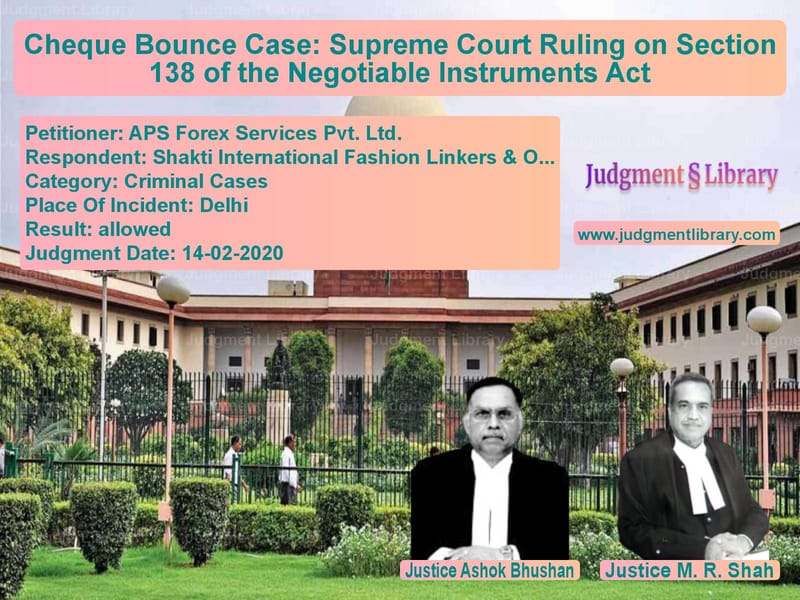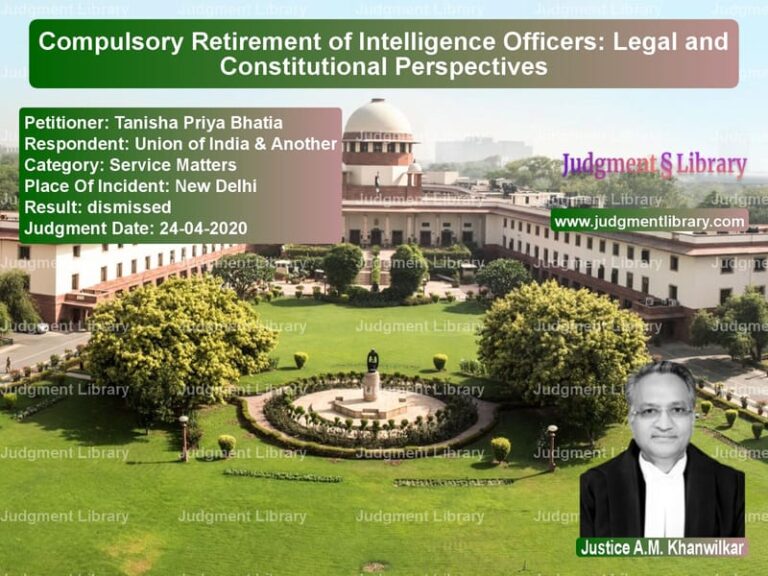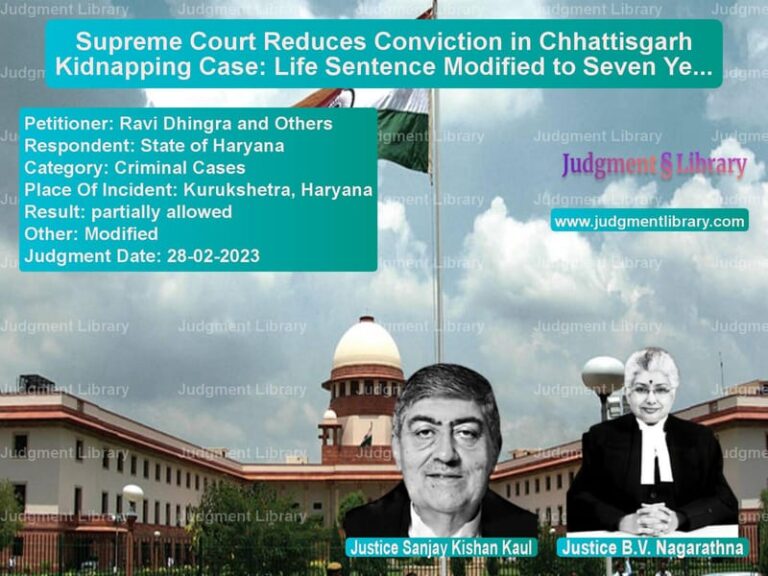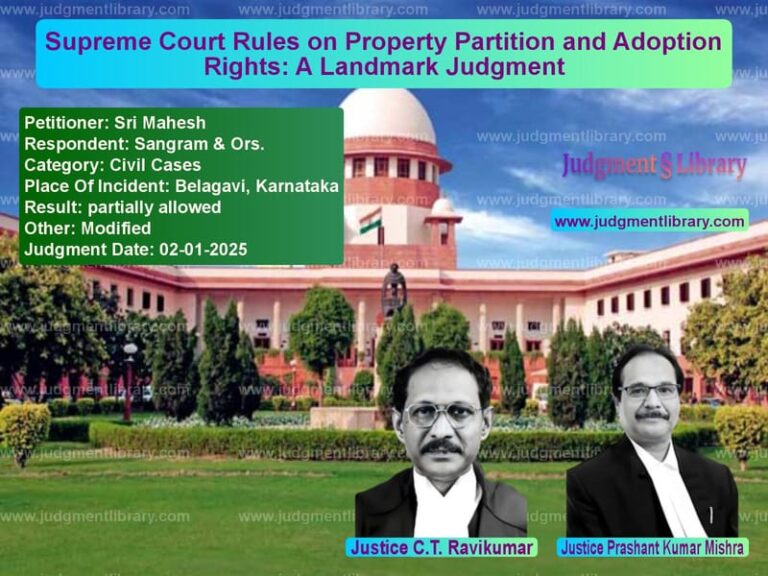Cheque Bounce Case: Supreme Court Ruling on Section 138 of the Negotiable Instruments Act
The Supreme Court of India delivered an important ruling in APS Forex Services Pvt. Ltd. v. Shakti International Fashion Linkers & Ors., addressing the enforcement of financial liabilities under Section 138 of the Negotiable Instruments Act, 1881 (N.I. Act). This decision clarifies the obligations of individuals and companies issuing cheques and the legal consequences of dishonored cheques.
Background of the Case
APS Forex Services Pvt. Ltd., the appellant, was engaged in the business of selling and purchasing foreign exchange. The respondents, Shakti International Fashion Linkers and others, had approached the appellant for issuance of Foreign Exchange Currency/USD Travel Currency Cards. The complainant alleged that a total sum of Rs. 19,01,320 was provided to the accused through Visa Travel Money Cards (VTM), and the amount was withdrawn on multiple occasions.
The respondents made a partial payment of Rs. 6,45,807, leaving a balance of Rs. 12,55,513. To settle this amount, the respondents issued four cheques amounting to Rs. 9,55,574. However, when the cheques were presented for payment, they were dishonored. Subsequently, the respondents issued another cheque for Rs. 9,55,574, which was also dishonored with the remark “STOP PAYMENT”.
The complainant then served a legal notice under Section 138 of the N.I. Act on June 7, 2014. As the accused failed to make the payment, APS Forex filed a criminal complaint before the Metropolitan Magistrate.
Legal Issues
- Was there a legally enforceable debt or liability against the accused?
- Did the accused issue the cheques as payment or as a mere security measure?
- Could the accused rebut the presumption under Section 139 of the N.I. Act?
Trial Court’s Decision
The Metropolitan Magistrate acknowledged the issuance and dishonor of the cheque but ruled in favor of the accused, stating that:
- The complainant failed to establish a legal liability.
- The payments made were not sufficiently proven.
- The accused had issued the cheque as a security measure and not as payment.
Based on these findings, the Trial Court acquitted the accused.
Appeal to the High Court
APS Forex challenged the acquittal before the Delhi High Court. However, the High Court upheld the Trial Court’s decision and dismissed the appeal on April 20, 2018.
Supreme Court’s Analysis
The Supreme Court, led by Justices Ashok Bhushan and M.R. Shah, reviewed the evidence and delivered a decisive ruling. The Court noted:
1. Presumption Under Section 139 of the N.I. Act
The Supreme Court emphasized that Section 139 creates a presumption in favor of the complainant that the cheque was issued for a legally enforceable debt or liability. The burden of proof is on the accused to rebut this presumption.
“Once the issuance of the cheque and the signature of the accused are admitted, the presumption under Section 139 applies, and it is for the accused to rebut it.”
2. Admission of Liability by the Accused
The Court noted that the accused had admitted issuing the cheque and had also acknowledged partial payments. This admission supported the complainant’s case.
3. Failure of the Accused to Rebut the Presumption
The accused argued that the cheque was issued only as security and not as a payment obligation. However, the Court found no evidence supporting this claim. The Supreme Court stated:
“A mere claim that the cheque was given as security is not sufficient to rebut the presumption under Section 139. The accused must provide evidence showing the absence of a legally enforceable debt.”
4. Effect of ‘Stop Payment’ Orders
The Supreme Court clarified that a ‘STOP PAYMENT’ order does not absolve the drawer of the cheque from liability under Section 138. The Court reaffirmed:
“A cheque dishonored due to ‘STOP PAYMENT’ is still covered under Section 138, provided the cheque was issued to discharge a legally enforceable debt.”
5. Legal Precedents Considered
The Court referred to previous landmark judgments, including:
- Rangappa v. Sri Mohan (2010) 11 SCC 441 – Affirming the presumption under Section 139.
- K.N. Beena v. Muniyappan (2001) 8 SCC 458 – Holding that the burden lies on the accused to prove the absence of liability.
- Basalingappa v. Mudibasappa (2019) 5 SCC 418 – Discussing rebuttal of the presumption under Section 139.
Final Judgment
The Supreme Court set aside the judgments of the High Court and the Trial Court, convicting the accused under Section 138 of the N.I. Act. The Court issued the following directions:
- The accused was sentenced to three months’ simple imprisonment.
- A fine of Rs. 10,000 was imposed.
- The accused was ordered to pay Rs. 19,11,148 as compensation within eight weeks.
Key Takeaways
- Cheque dishonor due to ‘STOP PAYMENT’ is covered under Section 138.
- Presumption under Section 139 favors the complainant. The accused must provide evidence to rebut it.
- Security cheques can be enforced if issued towards an existing liability.
- Failure to rebut the presumption leads to conviction.
Conclusion
The Supreme Court’s ruling in APS Forex Services Pvt. Ltd. v. Shakti International Fashion Linkers is a landmark decision that strengthens the legal framework for enforcing financial liabilities under the Negotiable Instruments Act. By reaffirming the presumption of liability under Section 139 and clarifying that dishonor due to ‘STOP PAYMENT’ does not absolve the drawer of responsibility, this judgment ensures stricter compliance with financial commitments and protects creditors from fraudulent defenses.
Petitioner Name: APS Forex Services Pvt. Ltd..Respondent Name: Shakti International Fashion Linkers & Ors..Judgment By: Justice Ashok Bhushan, Justice M. R. Shah.Place Of Incident: Delhi.Judgment Date: 14-02-2020.
Don’t miss out on the full details! Download the complete judgment in PDF format below and gain valuable insights instantly!
Download Judgment: APS Forex Services P vs Shakti International Supreme Court of India Judgment Dated 14-02-2020.pdf
Direct Downlaod Judgment: Direct downlaod this Judgment
See all petitions in Fraud and Forgery
See all petitions in Cheque Dishonour Cases
See all petitions in Judgment by Ashok Bhushan
See all petitions in Judgment by Mukeshkumar Rasikbhai Shah
See all petitions in allowed
See all petitions in supreme court of India judgments February 2020
See all petitions in 2020 judgments
See all posts in Criminal Cases Category
See all allowed petitions in Criminal Cases Category
See all Dismissed petitions in Criminal Cases Category
See all partially allowed petitions in Criminal Cases Category







